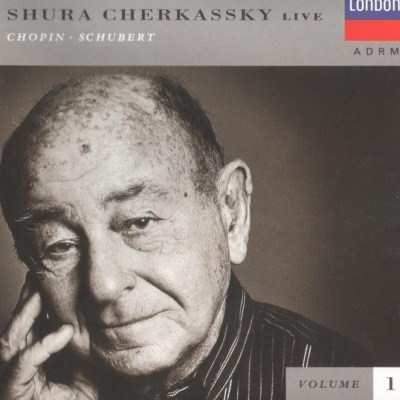
Shura Cherkassky: Live, Vol. 1
The Chopin Preludes are lit from within with a kind of luminous tone that Cherkassky seems to produce at will... Elsewhere he is wonderfully vivacious, almost naughty, the bravura always at the service of the music. Cherkassky 80—it seems impossible that the chirpy, imp-like figure seen bounding on to the platform with youthful enthusiasm on so many occasions can really be threescore and 20, but the calendar cannot lie. On disc he had been but intermittently represented, not least because he is a player of the moment's inspiration who dislikes the clinical anonymity of the studio. In the concert hall, energized and inspired by an audience's response, he can perform prodigies—as this CD gleaned from two LPs of different recitals in 1975, both of which I attended (if my memory is correct), proves. They were special occasions—what Cherkassky recital is not?—and they accurately represent his art, not to say his genius. I well recall the effect of the Schubert, a performance possibly to alarm the disciplined Schubertian but one to entrance the rest of us, delighted to hear fresh light thrown on the work by this artist's idiosyncratic ways, and it is a piece, effervescent and elusive, that responds well to his light-fingered, transparent style. Chopin has been, inevitably, a favourite of Cherkassky. He likes, as here, to pick and choose from the collections the pieces that suit him best, not necessarily the obvious ones. All the Preludes played here are lit from within with a kind of luminous tone that Cherkassky seems to produce at will. The three Etudes and the single Ballade show that he is quite as aware of form as any player more renowned for such things. The one Nocturne, like the Preludes, indicates that he fully empathizes with the elegiac side of Chopin's nature; indeed, for all his technical skill, Cherkassky can be a very inward pianist. Serious matters over, a Cherkassky recital will inevitably end with those jeux d'esprit for which he is famous. The Albeniz Tango is as delicate as the lightest croissant, the Rubinstein Melody is caressed with a lover's intimacy, Rachmaninov's famous Polka de V. R. is wonderfully vivacious, almost naughty, the bravura always at the service of the music. The recording is clear and faithful; coughs are minimal. Buy at once. -- Alan Blyth, Gramophone [10/1991]
